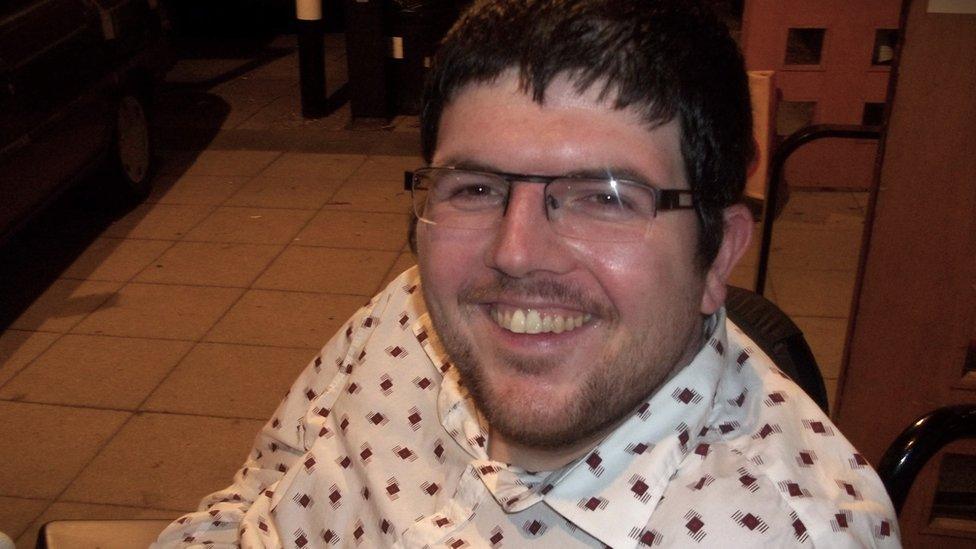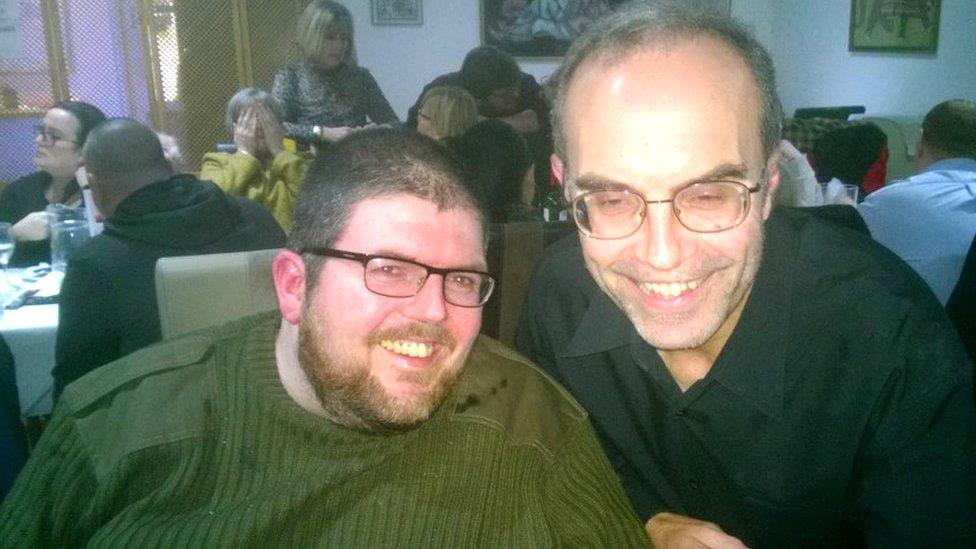Man with life-limiting condition 'stunned' council took back short break savings
- Published

Nathan Lee Davies had saved up to go on his first holiday in 24 years
A man with a life-limiting condition has said he is "stunned" his local authority "clawed back" money he saved to go on holiday with his carers.
By skipping cinema trips approved for his wellbeing by the council, Nathan Lee Davies saved up money from his round-the-clock care fund.
He wanted a six-day break in Florida to "have a bit of respite from the mundane reality of everyday life".
Wrexham County Borough Council said: "Surplus funds are to be returned."
Nathan, 47, has Friedrich's ataxia, a condition which affects his co-ordination, balance and speech. It also comes with a limited life expectancy.
He receives £11,000 in Direct Payments each month to pay for the 24-hour support he needs, he told the BBC Access All podcast.
Over many years, including during the Coronavirus pandemic, Nathan had foregone approved social activities and saved £50,000, while providing the council with bank statements every quarter to show he was not misusing the money.
He planned to use the savings for a six-day trip to Florida with a specialist travel company - his first holiday in 24 years - at a cost of £3,500. It was the "cheapest option" he could find, he said.
Nathan said he was happy to pay for his own flights and accommodation, but wanted support with funding the flights and accommodation of his two personal assistants (PAs) whom he cannot travel without.
"I have never wanted my holiday to be paid for," he said. "But I do object to having to pay for the people that will be working to support me."
It is an extra cost that non-disabled people do not have to pay.
He was hoping to utilise the remainder of the savings for future trips while he is still able to travel.
But when Nathan excitedly told his social worker about his plans, she said the council must have the money back.

Listen to the Access All podcast to hear more from Nathan about his story

"I was stunned that they would treat me like that," he said. "I deserve to escape from the home which is being made a prison."
Wrexham Borough County Council said all of its social care plans were "designed" to support care needs alongside specified social activities, such as the cinema.
It said: "[Nathan] has not engaged in the social activities that he receives Direct Payment funding for, which is a choice that he has every right to make.
"If an individual chooses not to use their social care funding on meeting their assessed needs then the policy in terms of claw back is clear that surplus funds are to be returned to the council."
The council added it was willing to fund Nathan's care while he was on holiday and it had "offered options" around him employing carers local to Florida. This would mean zero costs around accommodation and travel, and just the cost of the American carers, whom he would never have met before.
Nathan receives his funding through Direct Payments which enable him to manage his own care.
They can also be used to fund short breaks, which is considered a period of respite, if they are outlined in a care and support plan. This is not currently outlined in Nathan's plan.
Nathan said having gone through a divorce and kidney stones in the past few years, he needs respite from the numerous challenges he has faced and continues to face on a daily basis.
"It just feels like I've been short-changed," he said.

Human rights lawyer Anne-Marie Irwin from Rook Irwin Sweeney, who specialises in disability rights, said local authorities have a "duty to act rationally".
Even with the council offering to pay for carers local to Florida, she said the council must consider whether unfamiliar carers would meet his needs.
"I'm sure Nathan wants carers who are familiar with him. Is that really a rational decision to take that will mean his carers can't, in practice, go out there with him?"
She said a similar case was won in court by a family in 2021 after Suffolk County Council refused to support two disabled brothers in a similar trip to Florida.
The council had argued it was not required to meet the cost of supported holidays, but it was ultimately found that the local authority was ignoring a key element of the brothers' needs.
Chris, who is in a group of Nathan's friends which have created a co-operative to care and support him, said: "It becomes a matter of discretion for the council. And if they have the money, it's almost a moral decision that they just don't think it's appropriate for Nathan.
"Given the lifespan of someone with Friedrich's ataxia it's important that he gets this holiday whilst he's in the position to enjoy it and have some memories to look back on. "
Nathan appealed the council's decision to retrieve the money and lost.
The council said: "Mr Davies's appeal was managed through our complaints process and was subject to an independent investigation as part of that process."
Following the appeal it suspended Nathan's payments for October, November and December. It meant £33,000 of Nathan's disputed savings were used to absorb the cost of his care.
Nathan still plans to go on his trip later this year and is resigned to the fact he will have to foot the accommodation and flight-bill for his PAs as well as his own costs.
But he said delays in booking the trip, while he appealed the council's decision, meant the cost had now risen to £5,800.
"I just think it's totally unfair to put me in this position where I'm having to ask my 75-year-old mother for some financial support."
You can listen to the podcast and find information and support on the BBC Access All page. You can contact Beth with a story by emailing bethany.rose@bbc.co.uk
